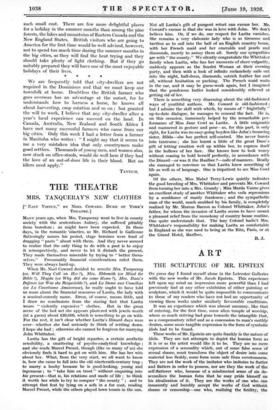THE THEATRE
MRS. TANQUERAY'S NEW CLOTHES
1" EASY VIRTUE," BY NOEL COWARD. DUKE OF YORK'S
• THEATRE.]
MANY years ago, when Mrs. Tanqueray went to live in county society with the sententious Aubrey, she suffered pitiably from boredom ; as might have been expected. In those days, in the romantic 'nineties, as Mr. Richard le Gallienne flatteringly names his period, stage heroines were fond of dragging " pasts " about with them. And they never seemed to realize that the only thing to do with a past is to enjoy it retrospectively, and never to let it disturb the present. They made themselves miserable by trying to " better them- selves." Presumably financial considerations ruled them. They were always hard-up.
When Mr. Noel Coward decided to rewrite Mrs. Tanqueray (or, Will They Call on Her ?), Mrs. Ebbsmith (or Mind the 'Bible 1), Magda (or Why did she come Home ?), Mrs. Dane's Defence (or Was she Respectable ?), and La Dame aux Camelias (or La Courlisane Amoureuse), he really ought to have told us more about the financial resources of Larita, the lady with a musical-comedy name. Dress, of course, means little, and I draw no conclusions from the staring' fact that Larita wears " violently expensive " clothes. But in the great scene of the last act she appears plastered with jewels worth (at a guess) about £20,000, which is *something to go on with. For the rest, it isn't clear whether Larita's Dillard days were • over—whether she had seriously to think of settling down. --I hope she had ; otherwise she cannot be forgiven for marrying John Whittaker.
Larita has the gift of bright repartee, a certain aesthetic sensibility, a smattering of psycho:analytimil knowledge ; and she • reads Marcel Proust, though (like so many of us) she obviously finds it hard to get on with him. She has her wits about her. What, from the very start, we all want to know is, how she came to fall into the old nineteenth-century trap ; to marry a booby because he is good-looking, young and ingenuous ; to " take him on trust " without, enquiring into his present—that is, his relations and mode of life ; to think it worth her while to try to conquer " the county " ; and to attempt that feat by lying on a sofa in a fur coat, reading Marcel Proust, while the others played lawn tonnis in the sun. Not all Larita's gift of pungent retort can excuse her. Mr. Coward's excuse is that she was in love with John. We don't believe him. Or, if we do, our respect for Larita vanishes. She remains a very elaborate lady who is so tiresome and tactless as to sail into the hall of an English country house, with her French maid and her emeralds and pearls and diamonds, merely to annoy them all. Surely our sympathies- are with " the county." We silently congratulate the Whittaker family when Larita, who has her moments of sheer vulgarity, suddenly appears as the Scarlet Woman at their evening party, and then with a look of infinite melancholy sails out into the night, ball-dress, dianionds, ostrich feather fan and all, without hesitation or packing. The French maid waits in the car, and it may be guess-work again, but I imagined that the ponderous butler looked considerably relieved at getting rid of her. There is something very disarming about the old-fashioned ways of youthful authors. Mr. Coward is old-fashioned ; but I admire the skill with which, by means of " frightfully " up-to-date dialogue, he manages to conceal the fact. He is, on this occasion, immensely helped by the remarkable per- formance of- Miss Jane Cowl as Larita. A little enigmatic . and mannered in gesture and pose—as, for this part, is only right, for Larita was no easy-going hoyden like John's bouncing sister, Hilda—she has perfect self-eontrol. She never bursts into tantrums ; she has learnt a little of the great Duse's gift of letting emotion well up within her, to express itself in the hollows of her face. She knows how to look weary without ceasing to hold herself perfectly, in accordance with the Dinard—or was it the Baalbec ?—code of manners. Really she managed to convince us that Larita knew something of life as well as of language. One is impatient to see Miss Cowl
again.
Of the others, Miss Mabel Terry-Lewis quietly indicates the good breeding of Mrs. Whittaker and prevents Mr. Coward from turning her into a Mrs. Grundy ; Miss Marda Vanne gives an excellent study of another Whittaker who veils repressions by a semblance of manly frankness ; and the sympathetic man of the world, much snubbed by his family, is completely realized by Mr. Marcus Barron as Colonel Whittaker, John's father, for whom the invasion of Larita seems to have meant a pleasant relief from the monotony of country house ,routine. One quite understands that. The lazy Colonel hadn't Mrs. Whittakees responsibility for making Larita as comfortable in England as she was used to being at the Ritz, Paris, or at the Grand Hotel, Baalbec.
R. J.










































 Previous page
Previous page